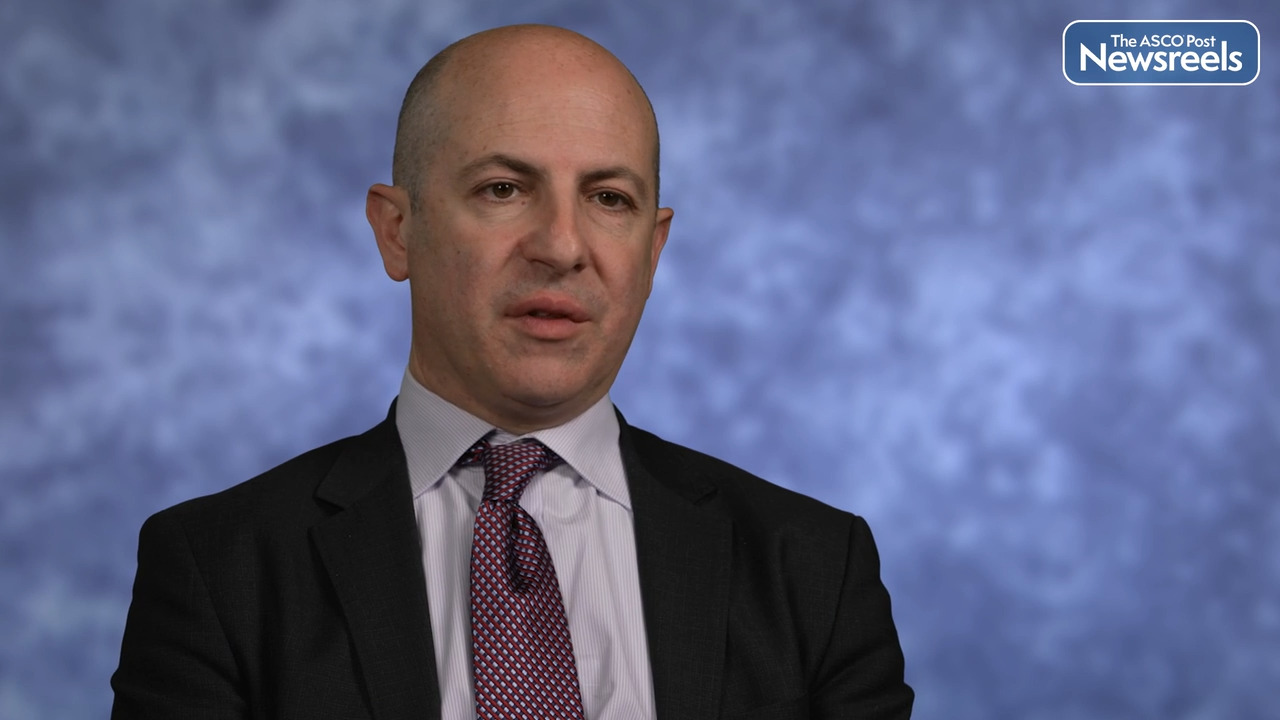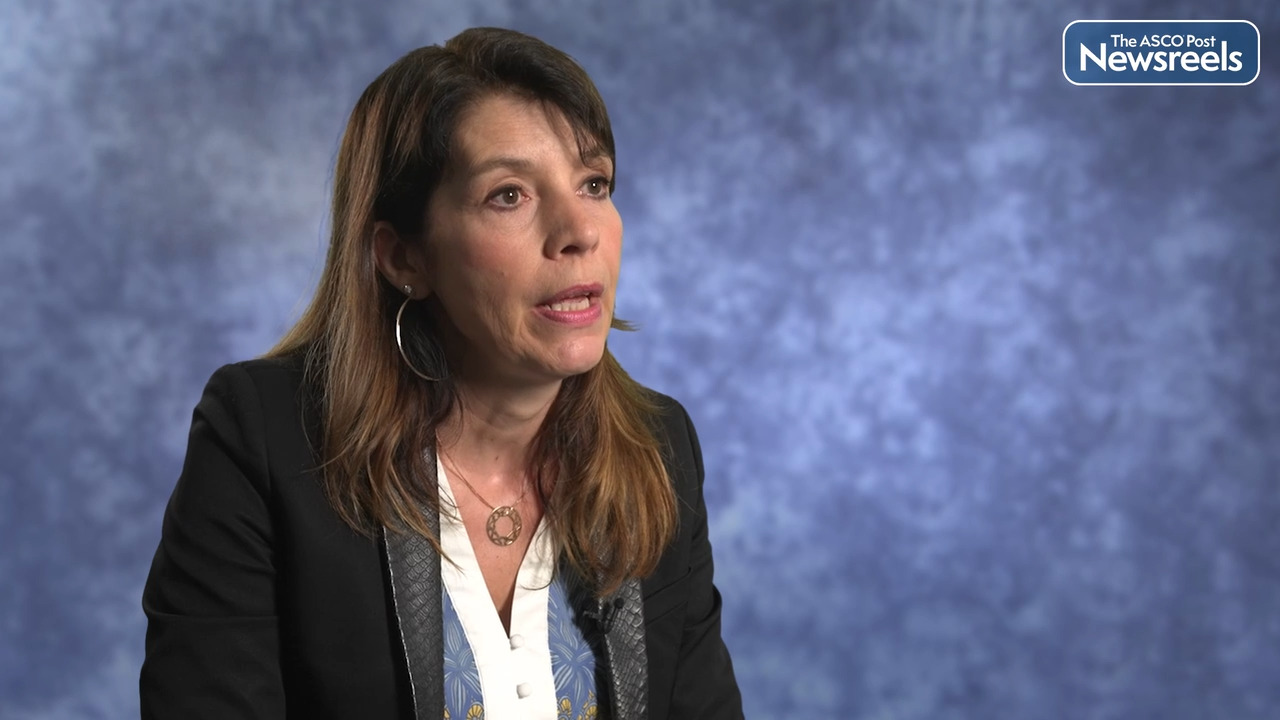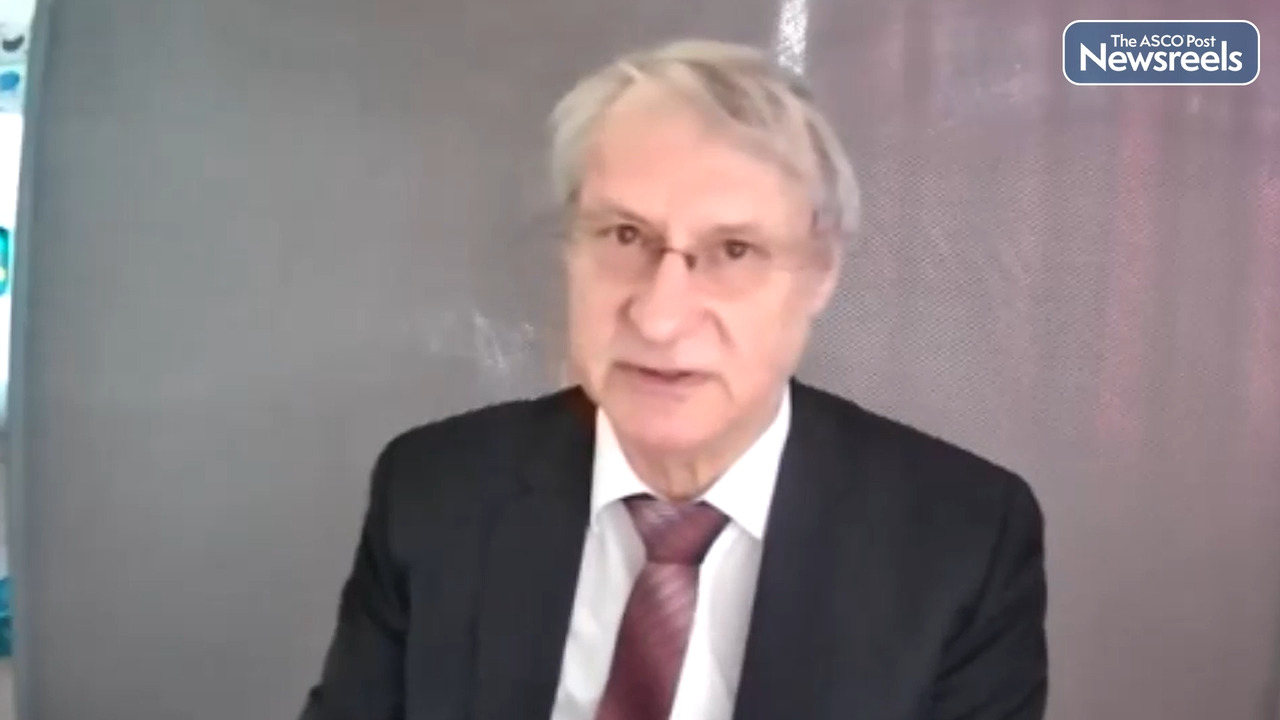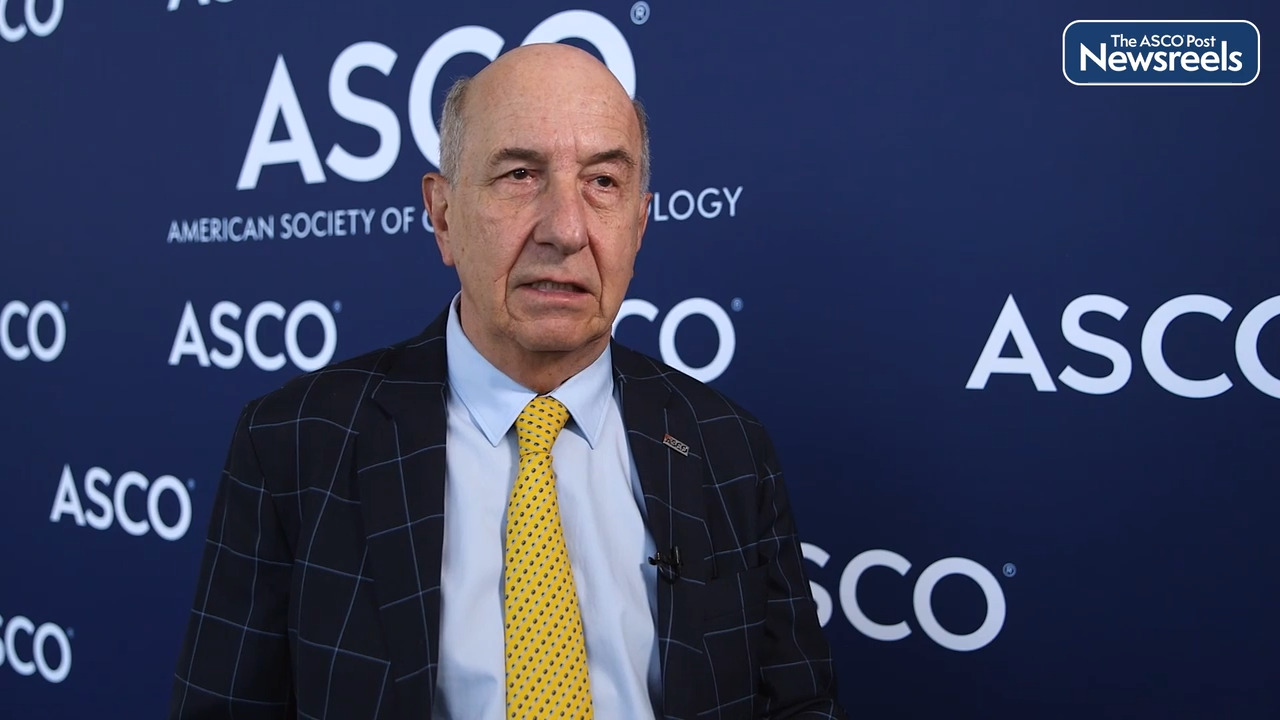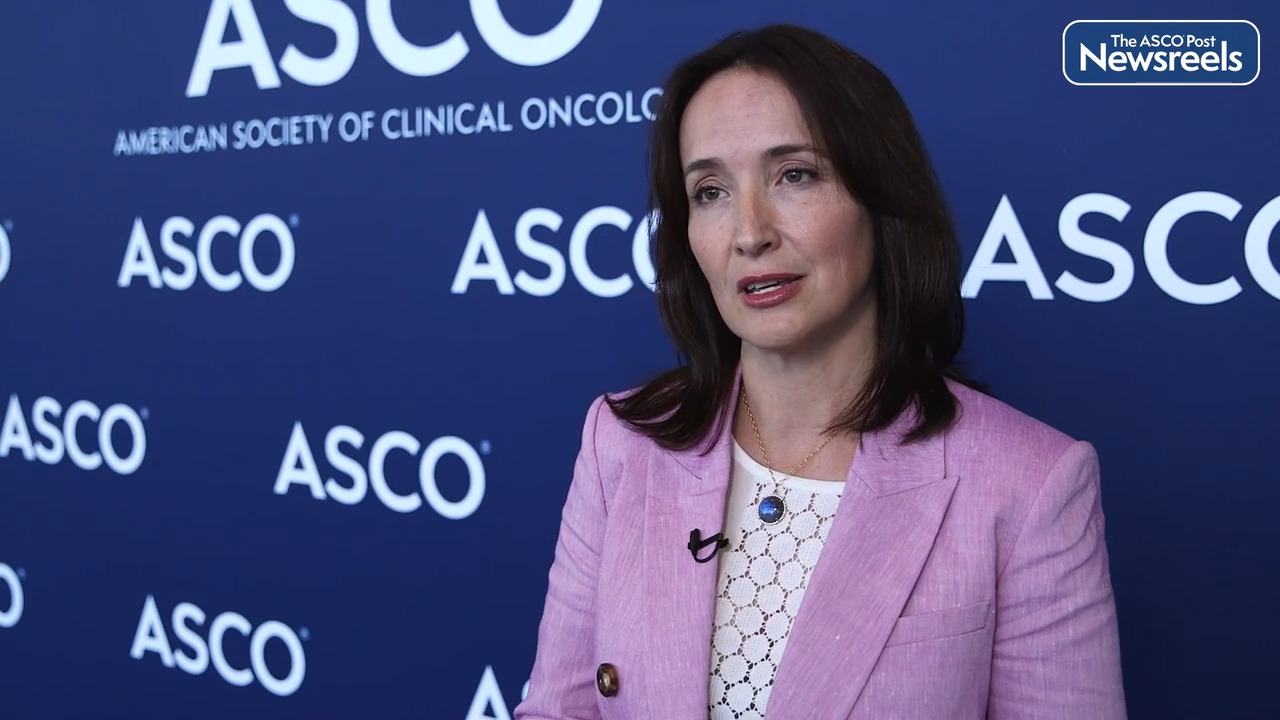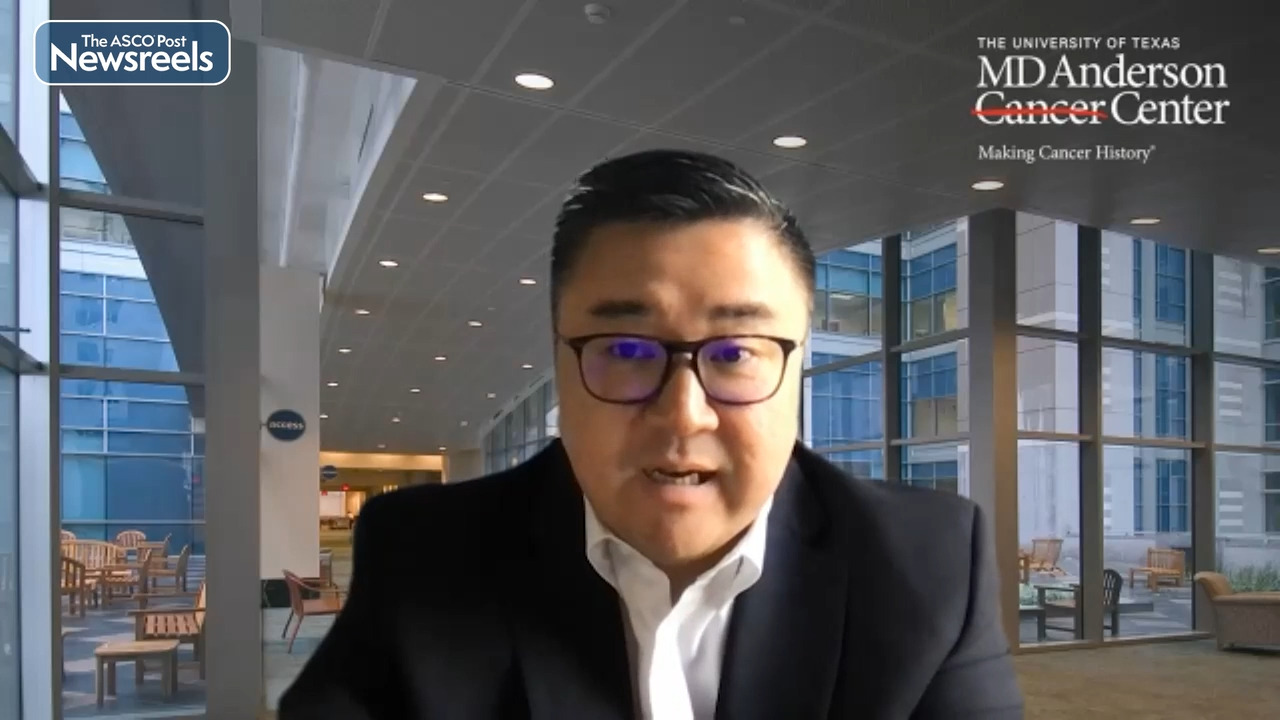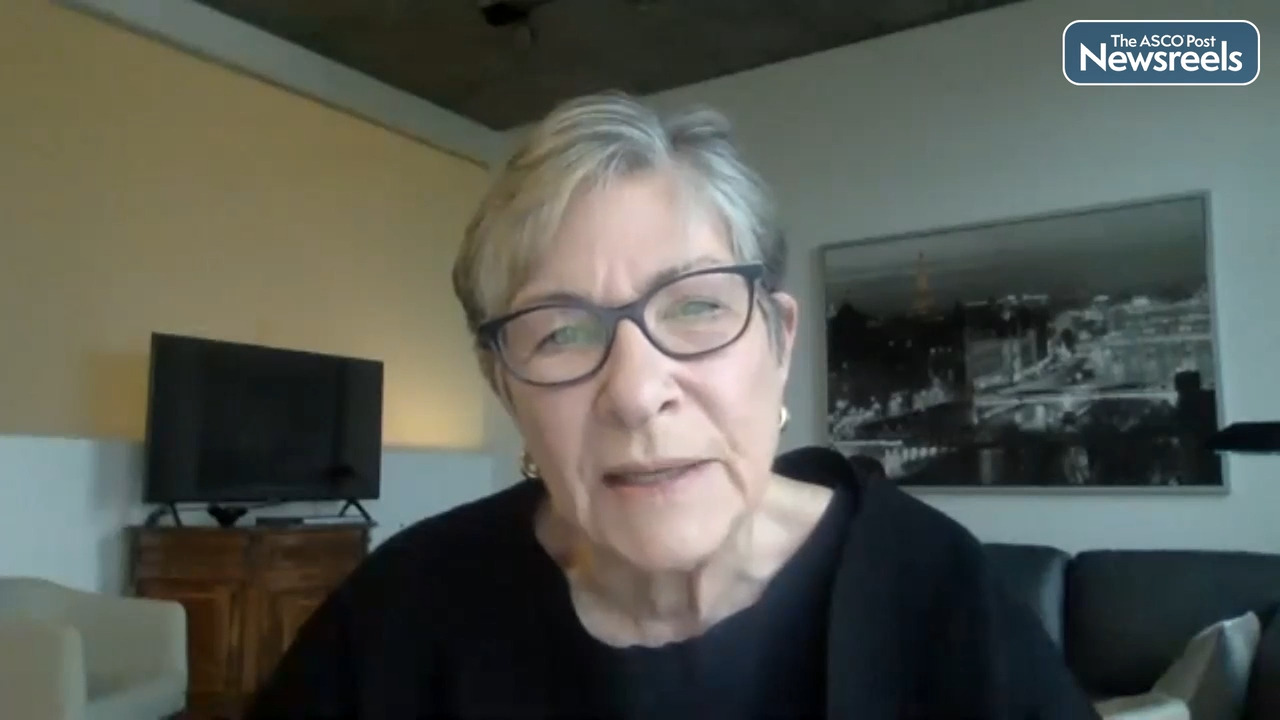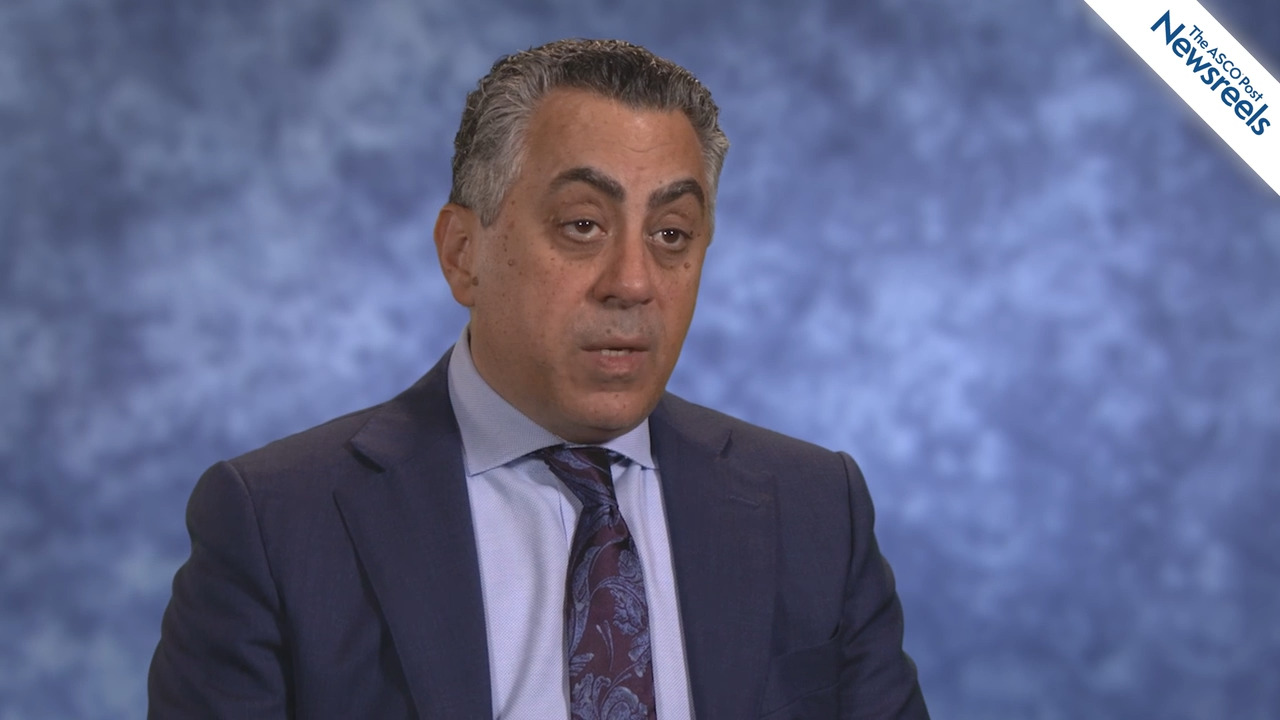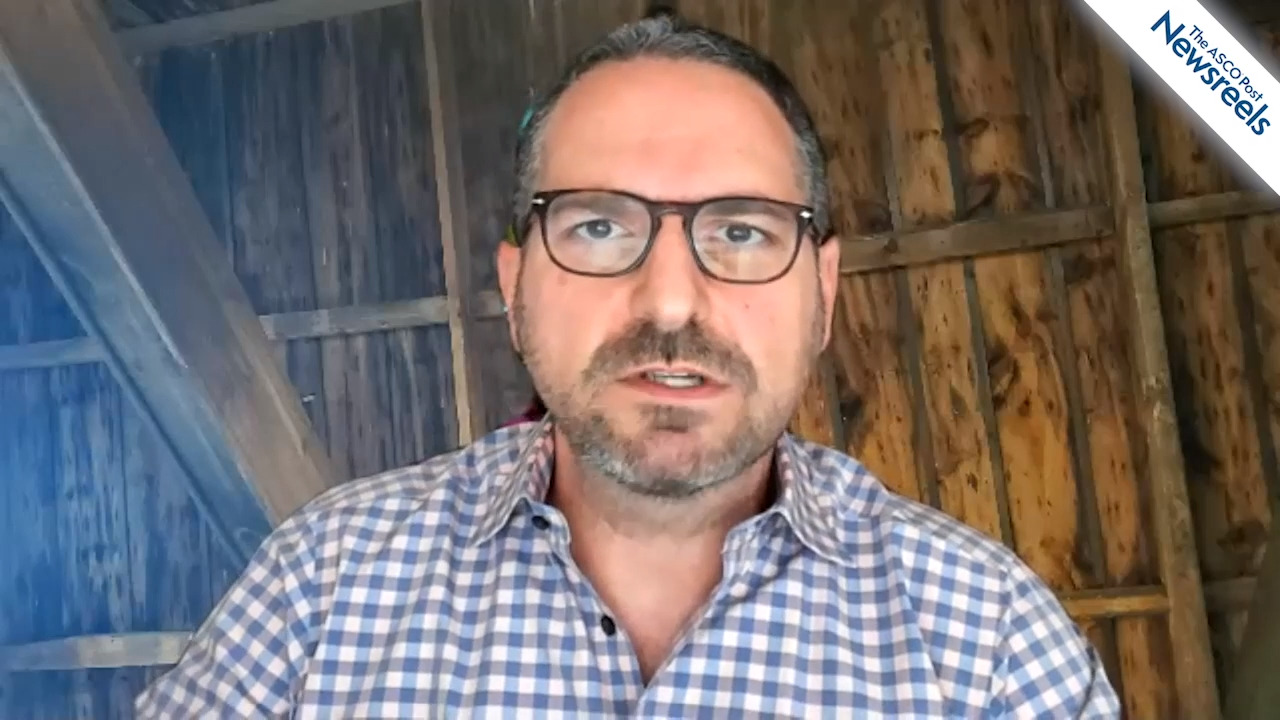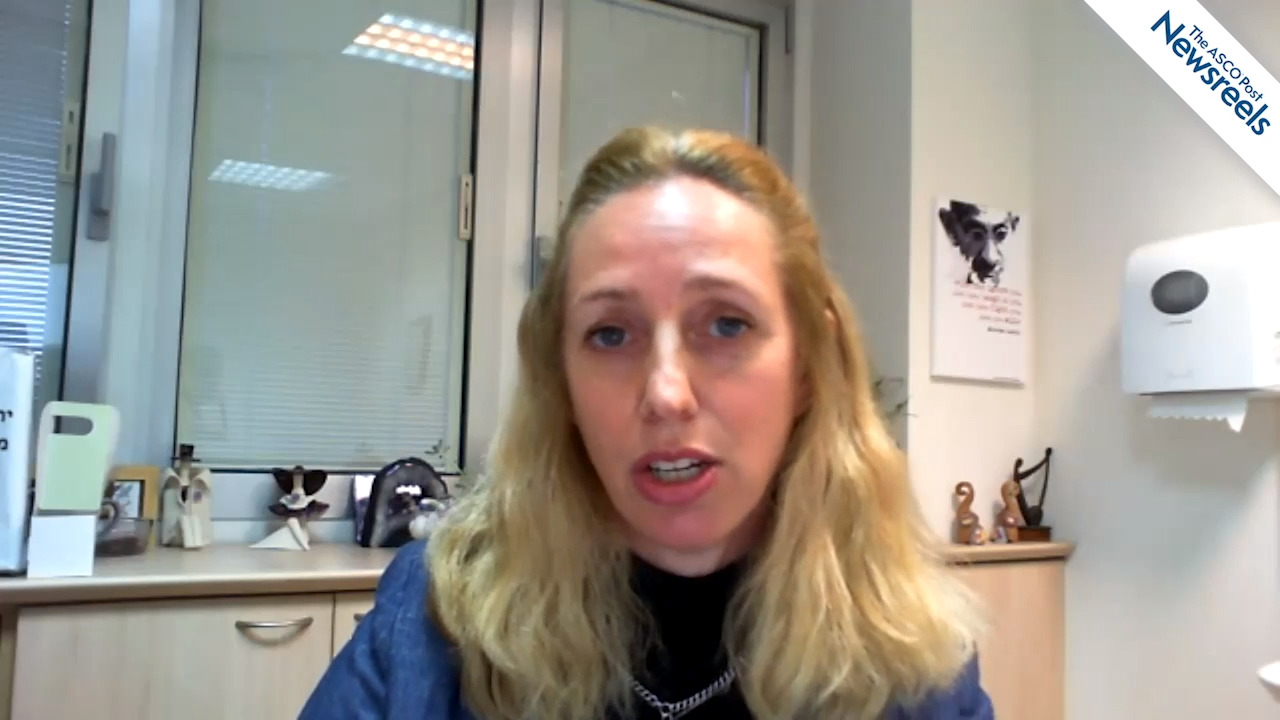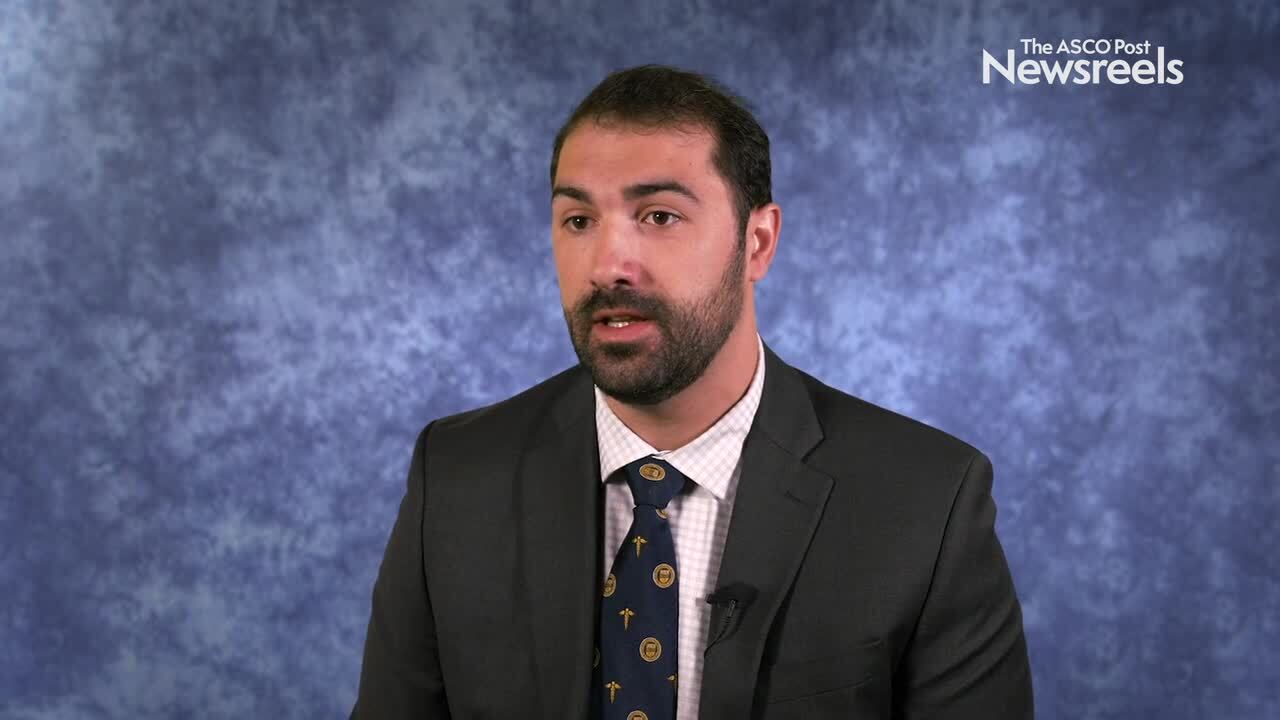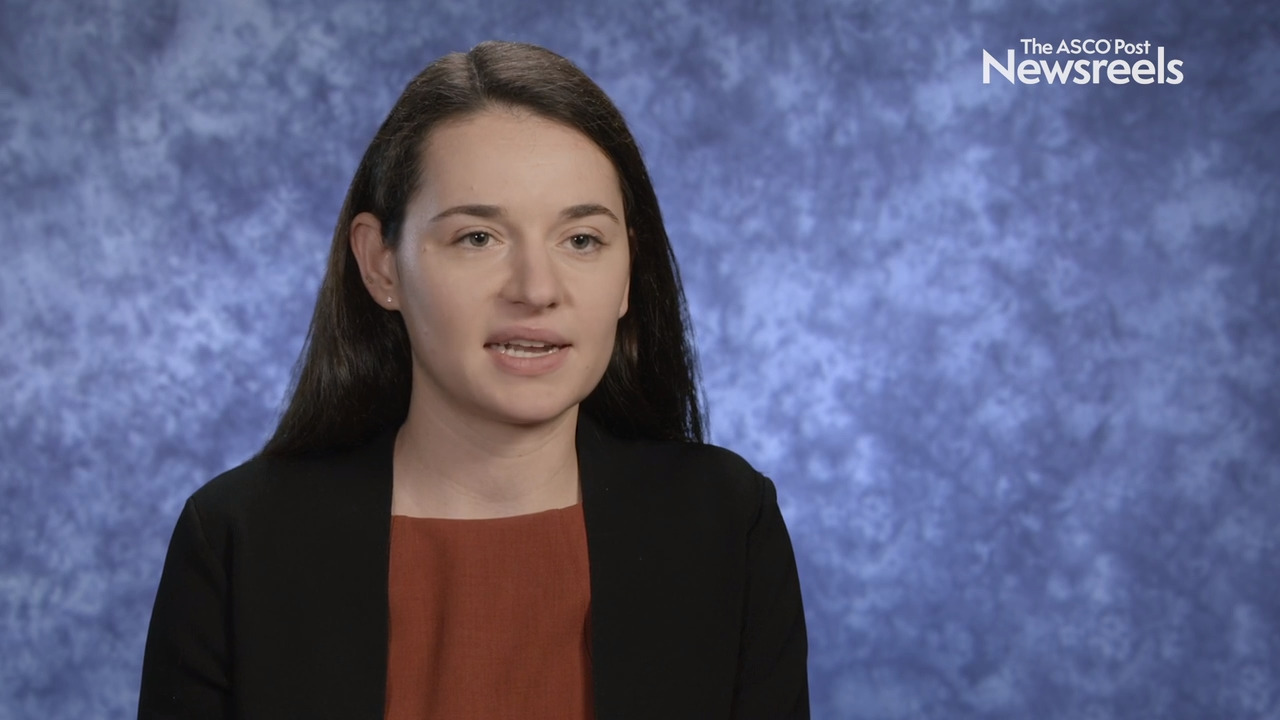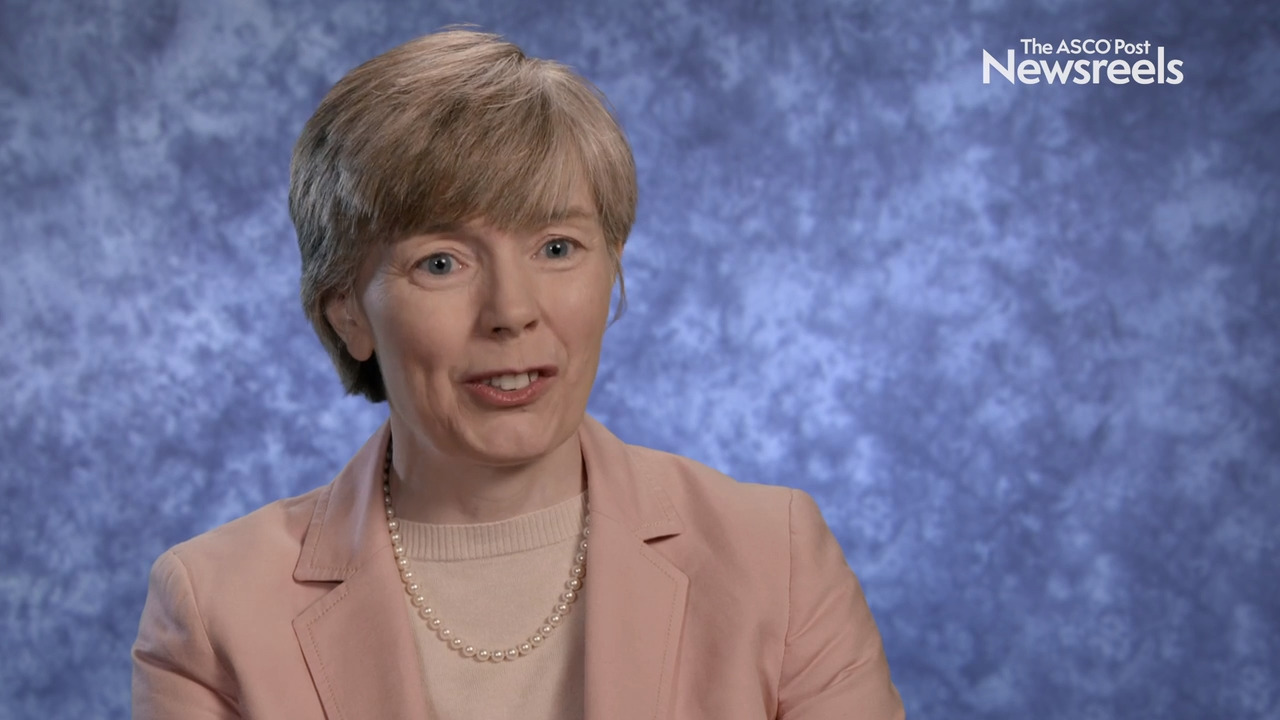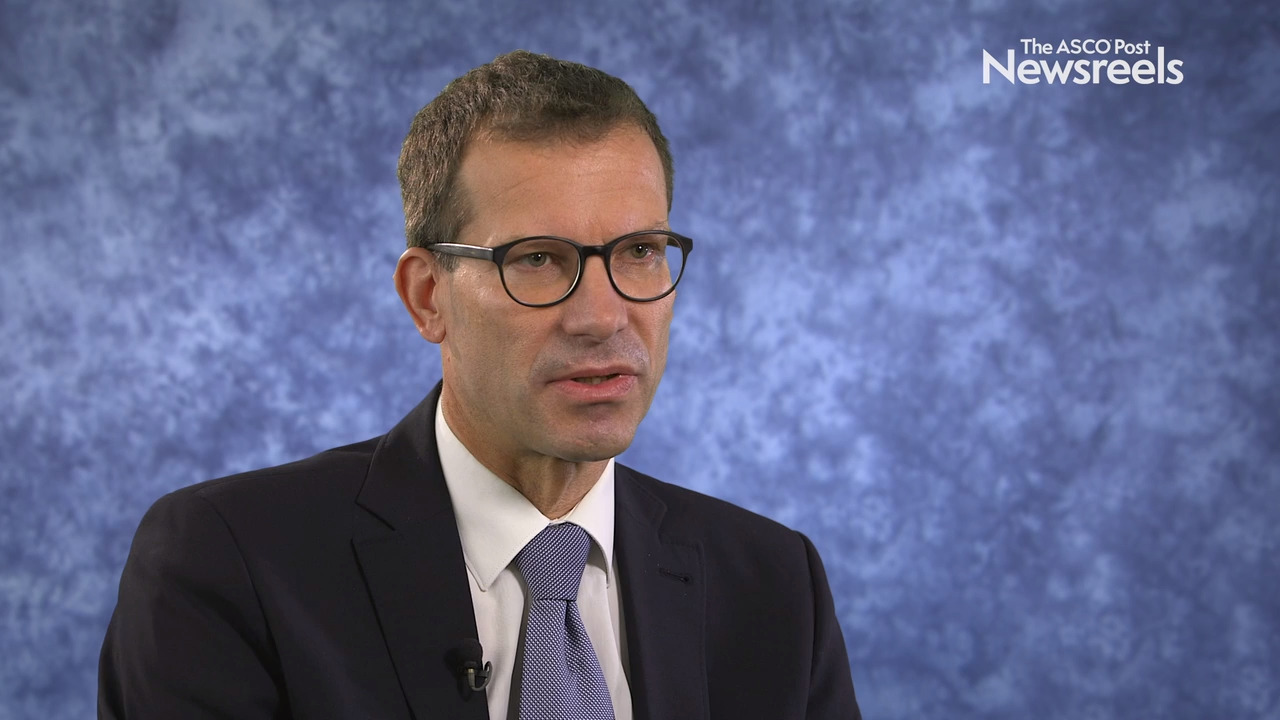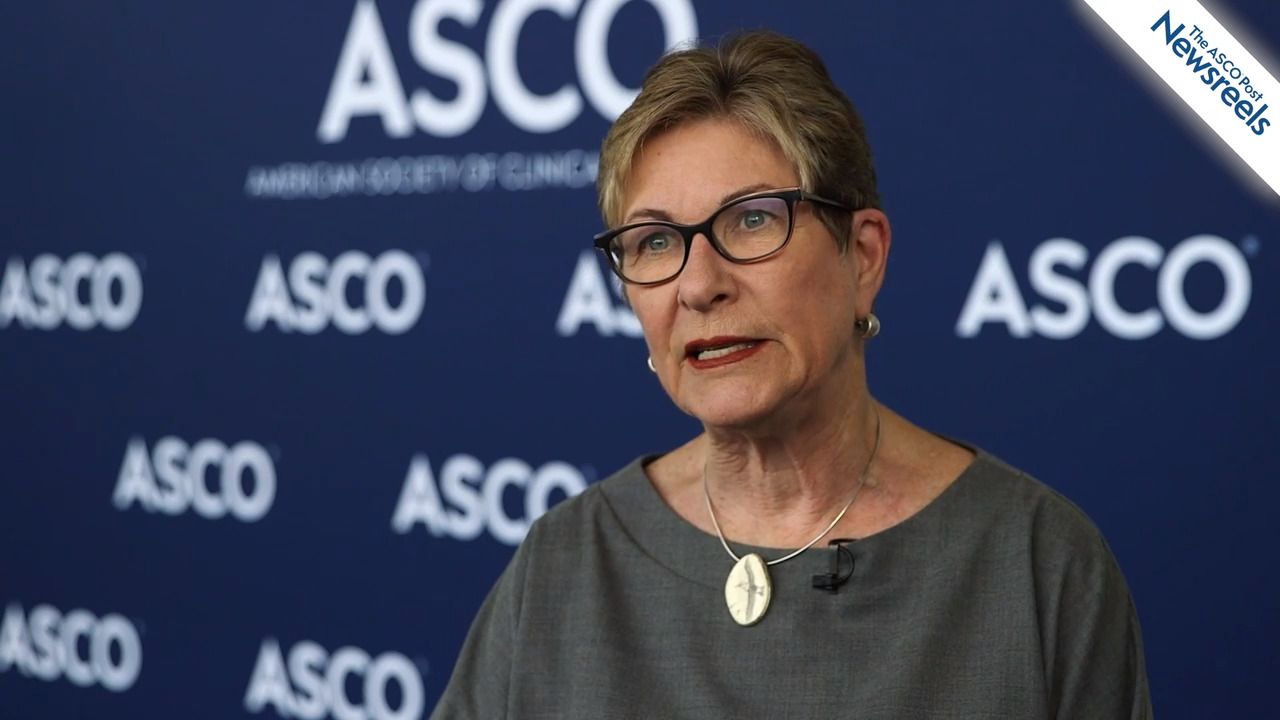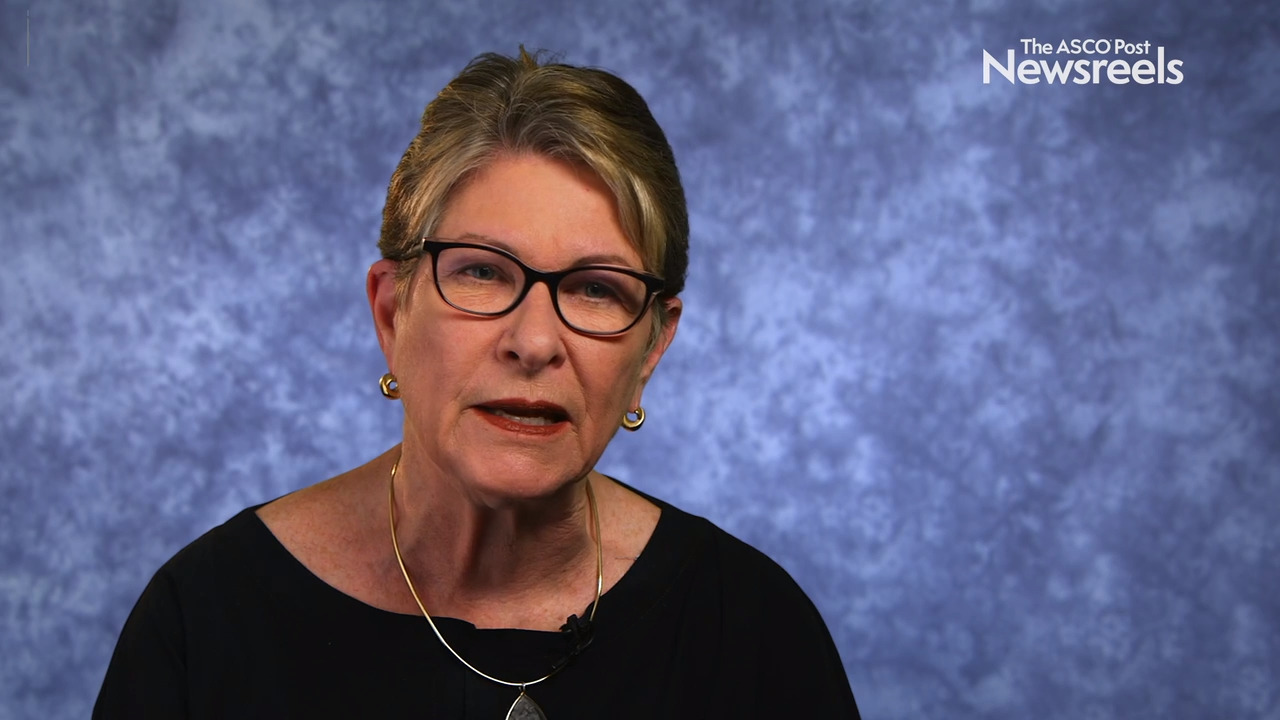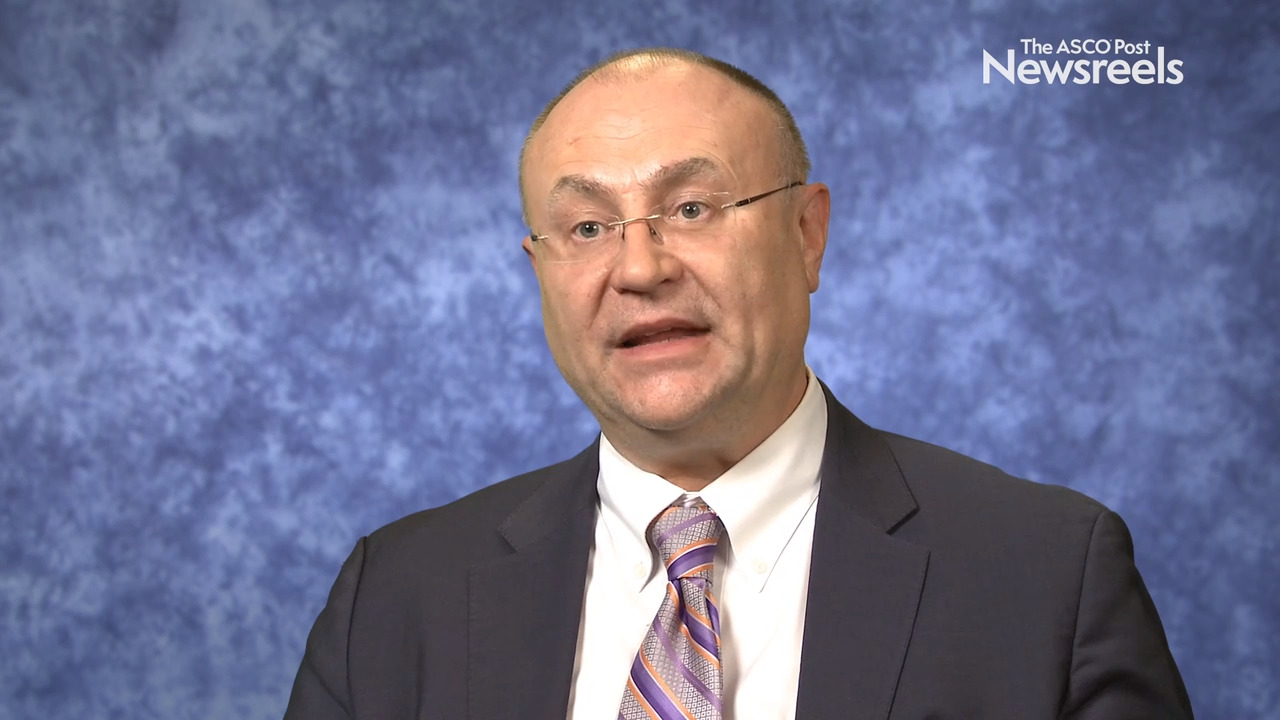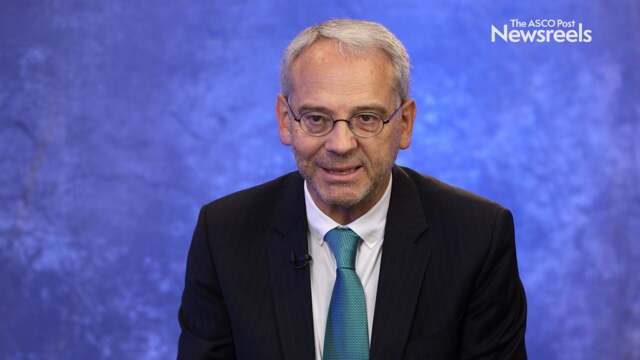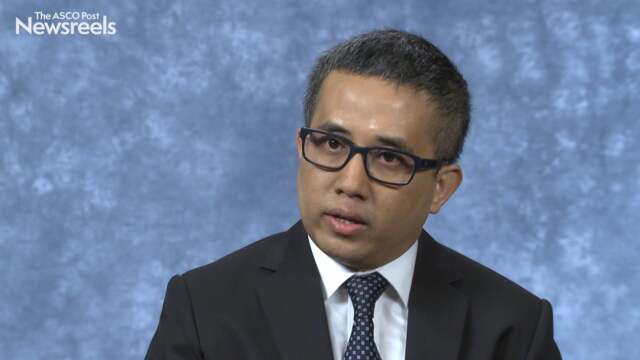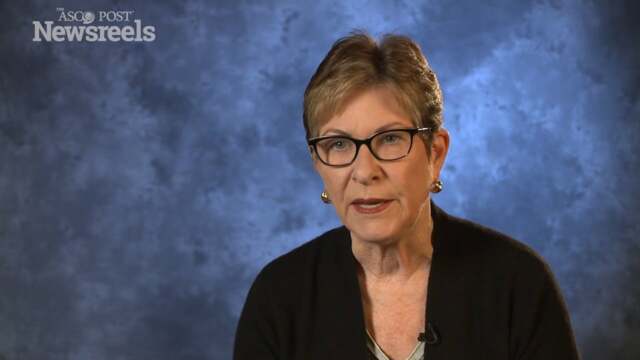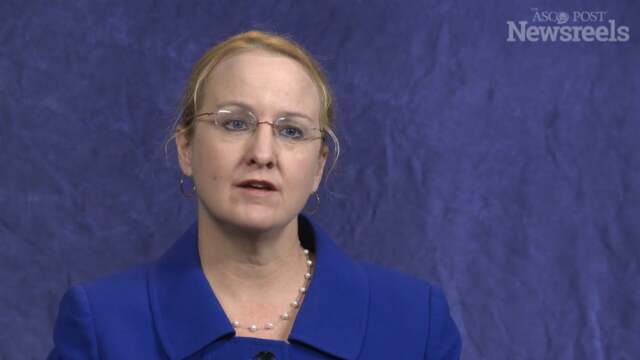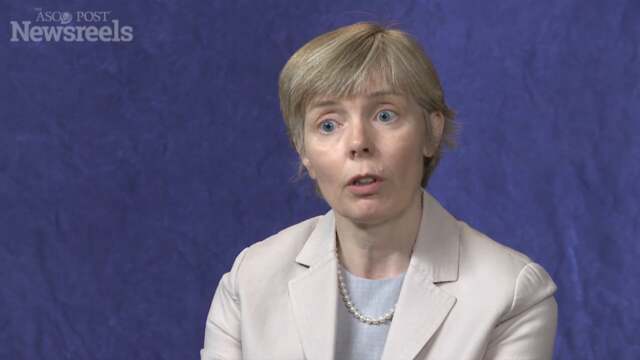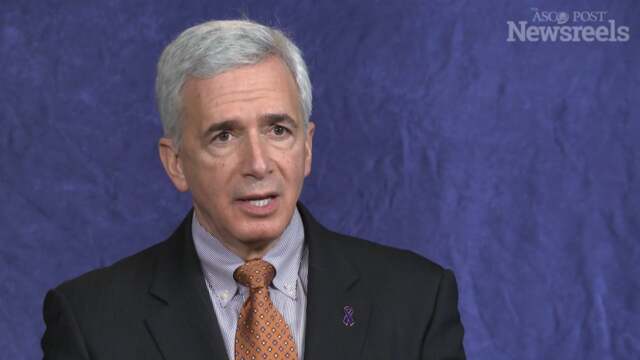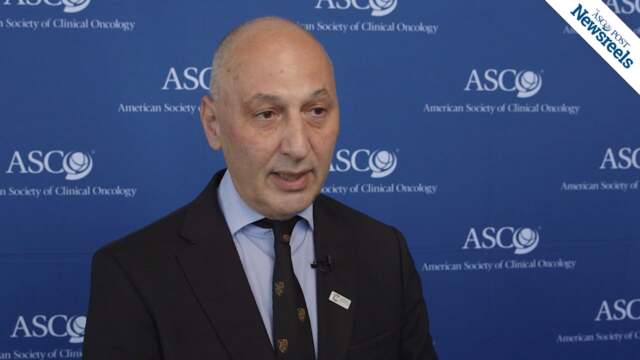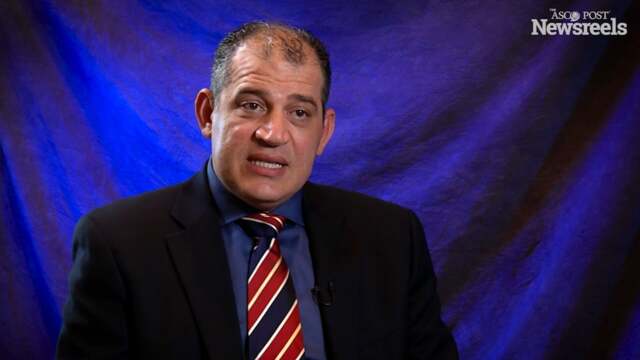Case 3: Radioligands in Advanced Neuroendocrine Tumor
This is Part 3 of Evolving Treatment Paradigms for Neuroendocrine Tumors, a three-part video roundtable series. Scroll down to watch the other videos from this roundtable. In this video, Drs. Daniel Halperin, Jess Maxwell, and Virginia Corbett discuss the use of radioligand therapy for advanced neuroendocrine tumors (NETs). The patient is a 72-year-old man who was incidentally found to have small hypervascular liver masses on screening computer tomography. Abdominal imaging revealed a 1.8-cm pancreatic tail lesion and disseminated subcentimeter liver metastases occupying 20% of the liver parenchyma. A biopsy confirmed a grade 1 NET with Ki-67 1%. In the conversation that follows, the faculty discuss whether they would proceed with surgery or opt for a somatostatin analog, treatment options after disease progression, sequencing considerations when using peptide receptor radionuclide therapy, and more.
Case 1: Pancreatic Neuroendocrine Tumor
This is Part 1 of Evolving Treatment Paradigms for Neuroendocrine Tumors, a three-part video roundtable series. Scroll down to watch the other videos from this roundtable. In this video, Drs. Daniel Halperin, Jess Maxwell, and Virginia Corbett discuss the treatment of pancreatic neuroendocrine tumors (NET). The patient is a 40-year-old woman who presents with right flank pain, nausea, and vomiting. She is found to have hypercalcemia secondary to hyperparathyroidism, and a contrast-enhanced computed tomography reveals multifocal hypervascular lesions in the pancreas. Genetic testing confirms multiple endocrine neoplasia, type 1 (MEN1). In the conversation that follows, the faculty discuss the role of genetic testing in patients with multifocal pancreatic NETs, when surgical resection is appropriate, and potential treatment options for this patient—including temozolomide, everolimus, and radioligand therapy.
Asaf Maoz, MD, on Pancreatic Surveillance Eligibility Criteria
Asaf Maoz, MD, of Dana-Farber Cancer Institute/Mass General Brigham/Harvard Medical School, discusses the sensitivity of age and family history criteria for determining eligibility for pancreatic cancer surveillance among individuals with a hereditary risk for the malignancy (Abstract 10500).
Sameek Roychowdhury, MD, PhD, on Telemedicine in Clinical Trials
Sameek Roychowdhury, MD, PhD, of the Arthur G. James Cancer Hospital and Richard J. Solove Research Institute at The Ohio State University Wexner Medical Center, discusses a recently opened telemedicine clinical trial of pemigatinib in patients with advanced or metastatic FGFR-mutated pancreatic cancer, and the germination of a new initiative, TNT Cancer, which focuses on leveraging telemedicine to bring trials nationwide.
Efrat Dotan, MD, on Pancreatic Cancer in Older Adults: Defining the Optimal Treatment Approach
Efrat Dotan, MD, of Fox Chase Cancer Center, discusses results from the phase II EA2186 trial, the first prospective study aiming to define the optimal treatment approach for vulnerable older adults with newly diagnosed metastatic pancreatic cancer (Abstract 4003).
Belinda Lee, MBBS, on Early-Stage Pancreatic Cancer: New Data on Guiding Adjuvant Chemotherapy
Belinda Lee, MBBS, of Peter MacCallum Cancer Centre, Northern Health, Walter & Eliza Hall Institute, Melbourne, discusses findings from the AGITG DYNAMIC-Pancreas trial on the potential role of serial circulating tumor DNA testing after upfront surgery to guide adjuvant chemotherapy for early-stage disease (Abstract 107).
Jennifer Yon-Li Wo, MD, on Colorectal and Pancreatic Cancers: New Findings on SBRT With Ipilimumab and Nivolumab
Jennifer Yon-Li Wo, MD, of Massachusetts General Hospital, discusses the local failure rate of non-ablative hypofractionated radiation therapy in combination with the immune checkpoint inhibitors ipilimumab and nivolumab compared to ablative SBRT to treat metastatic microsatellite-stable colorectal and pancreatic cancers as a secondary analysis of four prospective trials. Dr. Wo and her team found that, despite using nearly half the radiation dose in those who received immunotherapy, there was no significant difference in local failure rates (Abstract 752).
Frank Kullmann, MD, on Metastatic Pancreatic Cancer: Recent Data on Gemcitabine and Nab-Paclitaxel
Frank Kullmann, MD, of Germany’s Klinikum Weiden, discusses results from the ALPACA trial, which suggest a dose-reduced regimen with alternating cycles of gemcitabine/nab-paclitaxel and gemcitabine monotherapy after three induction cycles of standard gemcitabine/nab-paclitaxel is feasible and associated with an overall survival comparable to that with standard treatment, as well as improved tolerability (Abstract 605).
Zev A. Wainberg, MD, on Pancreatic Ductal Adenocarcinoma: Recent Findings on NALIRIFOX vs Nab-paclitaxel Plus Gemcitabine
Zev A. Wainberg, MD, of the UCLA School of Medicine, discusses phase III findings from the NAPOLI-3 trial, which showed that first-line NALIRIFOX (liposomal irinotecan plus fluorouracil/leucovorin plus oxaliplatin) improved overall and progression-free survival compared with nab-paclitaxel plus gemcitabine in treatment-naive patients with metastatic pancreatic ductal adenocarcinoma. The safety profile of NALIRIFOX was manageable and consistent with the profiles of each agent (Abstract LBA661).
Christelle de la Fouchardiere, MD, on Pancreatic Ductal Adenocarcinoma: Phase III Trial Results With Gemcitabine Plus Paclitaxel
Christelle de la Fouchardiere, MD, of France’s Centre Léon Bérard, discusses phase III findings from the PRODIGE 65–UCGI 36–GEMPAX UNICANCER study, which evaluated whether the combination of gemcitabine and paclitaxel improves overall survival compared with gemcitabine alone in patients with metastatic pancreatic ductal adenocarcinoma after FOLFIRINOX failure or intolerance (Abstract LBA60).
Rainer Fietkau, MD, on Pancreatic Cancer: Initial Trial Results on Sequential Chemotherapy and Chemoradiotherapy
Rainer Fietkau, MD, of Germany’s University Hospital Erlangen, discusses phase III findings of the CONKO-007 trial, which examined the role of sequential chemotherapy and chemoradiotherapy administered to patients with nonresectable locally advanced pancreatic cancer following standard-of-care chemotherapy (Abstract 4008).
Alfredo Carrato, MD, PhD, on Pancreatic Cancer: Nab-Paclitaxel, Gemcitabine, and FOLFOX for Metastatic Disease
Alfredo Carrato, MD, PhD, of Alcala de Henares University in Spain, discusses phase II results from the SEQUENCE trial, which showed that nab-paclitaxel, gemcitabine, and modified FOLFOX showed significantly higher clinical activity than the standard nab-paclitaxel and gemcitabine in the first-line setting of patients with untreated metastatic pancreatic ductal adenocarcinoma (Abstract 4022).
Pamela L. Kunz, MD, on Pancreatic Neuroendocrine Tumors: A Final Analysis of Temozolomide or Temozolomide Plus Capecitabine
Pamela L. Kunz, MD, of the Yale University School of Medicine, discusses new findings from the ECOG-ACRIN E2211 trial, which showed the longest progression-free survival and highest response rates with temozolomide plus capecitabine reported to date for patients with pancreatic neuroendocrine tumors. The presence of a deficiency of MGMT, the drug-resistance gene, was associated with greater odds of an objective response (Abstract 4004).
Christine A. Iacobuzio-Donahue, MD, PhD, on Pancreatic Cancer: Novel Insights Into Genetics and Evolution
Christine A. Iacobuzio-Donahue, MD, PhD, of Memorial Sloan Kettering Cancer Center, discusses her research on the evolutionary features of advanced stage pancreatic cancers and the insights that may be used to help improve patient outcomes (Abstract PL05).
Timothy A. Yap, MBBS, PhD, on Ovarian, Breast, Pancreatic, and Prostate Cancers With Genetic Mutations: A First-in-Human Trial of AZD5305
Timothy A. Yap, MBBS, PhD, of The University of Texas MD Anderson Cancer Center, discusses results from the PETRA study, a first-in-class, first-in-human trial of the next-generation PARP1-selective inhibitor AZD5305 in patients with BRCA1/2, PALB2, or RAD51C/D mutations in advanced or metastatic ovarian cancer, HER2-negative breast cancer, pancreatic, or prostate cancer. Target engagement was demonstrated across all dose levels, and antitumor activity was observed in selected tumor and molecular subtypes.
Margaret A. Tempero, MD, on Pancreatic Adenocarcinoma: Emerging Systemic Therapy Options
Margaret A. Tempero, MD, of the University of California, San Francisco Helen Diller Family Comprehensive Cancer Center, discusses the most effective ways to use the regimens available to treat patients with pancreatic cancer (FOLFIRINOX [fluorouracil, leucovorin, irinotecan, and oxaliplatin] and gemcitabine plus albumin-bound paclitaxel). Dr. Tempero also reviews the upfront use of chemotherapy for resectable disease, and ways to modify these therapies to make them more tolerable for patients. Looking ahead, she expresses hope for the new drugs under development, which may inactivate RAS, a major driver of the disease.
Tanios S. Bekaii-Saab, MD, on Pancreatic and Other Tumors With KRAS G12C Mutation: Updated Data on Use of Adagrasib
Tanios S. Bekaii-Saab, MD, of Mayo Clinic, discusses new findings from the KRYSTAL-1 study, which suggested adagrasib monotherapy is well tolerated and demonstrates clinical activity in pretreated patients with unresectable or metastatic pancreatic cancer or other gastrointestinal tumors harboring a KRAS G12C mutation. Adagrasib is an inhibitor of the KRAS G12C mutation (Abstract 519).
Katelyn T. Byrne, PhD, on the Clinical Impact of T-Cell Inflammation in the Tumor Microenvironment
Katelyn T. Byrne, PhD, of the Perelman School of Medicine at the University of Pennsylvania, discusses the first in-depth analysis of the impact of selicrelumab, an anti-CD40 antibody, which was found to enrich T cells in pancreatic tumors, activate the immune system, and alter the tumor stroma (Abstract CT005).
Matthew H.G. Katz, MD, on Pancreatic Cancer: Preoperative mFOLFIRINOX for Resectable Disease
Matthew H.G. Katz, MD, of The University of Texas MD Anderson Cancer Center, discusses findings from the Alliance A021501 study, which showed that administering mFOLFIRINOX before surgery was associated with a favorable overall survival rate relative to historical data in patients with borderline resectable adenocarcinoma of the pancreas (Abstract 377).
Talia Golan, MD, on Pancreatic Cancer: Olaparib for BRCA-Mutated Disease
Talia Golan, MD, of the Oncology Institute, Sheba Medical Center, discusses phase III results from the POLO trial, which explored the question of whether maintenance olaparib could improve overall and progression-free survival for patients with germline BRCA-mutated metastatic pancreatic cancer (Abstract 378).
Luis I. Ruffolo, MD, on Pancreatic Cancer: Augmenting Immunotherapy With Antibody Blockade of Semaphorin 4D
Luis I. Ruffolo, MD, of the University of Rochester, discusses preclinical studies showing that semaphorin 4D blockade may sensitize pancreatic tumors to chemoimmunotherapy combinations (Abstract 26).
Danielle S. Bitterman, MD, on Pancreatic Cancer: Noninvasive Genomic Profiling From Plasma ctDNA
Danielle S. Bitterman, MD, of the Harvard University Radiation Oncology Program and Massachusetts General Hospital, discusses an analysis of genomic and clinical data from 97 patients with pancreatic ductal adenocarcinoma with circulating tumor DNA. Mutations were most frequently detected in patients with locally advanced and metastatic disease (Abstract 753).
Eileen M. O’Reilly, MD, on Pancreatic Adenocarcinoma: Gemcitabine, Cisplatin, and Veliparib
Eileen M. O’Reilly, MD, of Memorial Sloan Kettering Cancer Center, discusses phase II trial findings showing that cisplatin and gemcitabine, with or without veliparib, exceeded a prespecified response rate for patients with pancreatic adenocarcinoma and a germline BRCA/PALB2 mutation (Abstract 639).
Volker Kunzmann, MD, on Advanced Pancreatic Cancer: Findings on nab-Paclitaxel/Gemcitabine and FOLFIRINOX
Volker Kunzmann, MD, of the University of Würzburg/Comprehensive Cancer Center Mainfranken, discusses the final results of a phase II multicenter trial on the conversion rate in locally advanced pancreatic cancer after nab-paclitaxel/gemcitabine- or FOLFIRINOX-based induction chemotherapy (Abstract 671O).
Margaret A. Tempero, MD, on Pancreatic Cancer: Adjuvant Nab-paclitaxel and Gemcitabine
Margaret A. Tempero, MD, discusses phase III results from the multicenter APACT trial, which showed that adjuvant nab-paclitaxel plus gemcitabine may be an option for patients who are ineligible for treatment with FOLFIRINOX (Abstract 4000).
Alok A. Khorana, MD, and Hedy L. Kindler, MD, on Metastatic Pancreatic Cancer: POLO Trial on Olaparib as Maintenance Therapy
Alok A. Khorana, MD, of the Cleveland Clinic, and Hedy L. Kindler, MD, of The University of Chicago, discuss phase III findings on olaparib as maintenance treatment following first-line platinum-based chemotherapy in patients with metastatic pancreatic cancer and a germline BRCA mutation (Abstract LBA4).
Margaret A. Tempero, MD, on Pancreatic Cancer: NCCN Guidelines Updates
Margaret A. Tempero, MD, of the UCSF Helen Diller Family Comprehensive Cancer Center, discusses new adjuvant therapy options for patients with pancreatic cancer, and germline testing, including testing for microsatellite instability/mismatch repair genes as well as molecular analysis of all tumors.
Andrew X. Zhu, MD, PhD, on Pancreatic Cancer: Results From the Prep-02/JSAP-05 Trial
Andrew X. Zhu, MD, PhD, of the Massachusetts General Hospital Cancer Center, discusses phase II/III study findings on neoadjuvant chemotherapy with gemcitabine and S-1 vs upfront surgery for resectable pancreatic cancer (Abstract 189).
Heinz-Josef Lenz, MD, on Pancreatic Cancer Tumor Profiling and Treatment Response: Results From the COMPASS Trial
Heinz-Josef Lenz, MD, discusses molecular profiling and response to chemotherapy in the COMPASS study, which was designed to evaluate the feasibility of using genomic sequencing in pancreatic cancer care (Abstract 188).
Thierry Conroy, MD, on Pancreatic Cancer: Results From the PRODIGE 24 Trial
Thierry Conroy, MD, of the Institut de Cancérologie de Lorraine, discusses phase III study findings on adjuvant mFOLFIRINOX vs gemcitabine in patients with resected pancreatic ductal adenocarcinomas (Abstract LBA4001).
Geertjan van Tienhoven, MD, PhD, on Pancreatic Cancer: Results From the PREOPANC-1 Trial
Geertjan Van Tienhoven, MD, PhD, of the Dutch Pancreatic Cancer Group, discusses phase III study findings on preoperative chemoradiotherapy vs immediate surgery for resectable and borderline resectable pancreatic cancer (Abstract LBA4002).
Ramesh K. Ramanathan, MD, on Metastatic Pancreatic Cancer: Results From a SWOG Study
Ramesh K. Ramanathan, MD, of the Mayo Clinic, discusses early-phase study findings on mFOLFIRINOX (mFFOX) plus pegylated recombinant human hyaluronidase vs mFFOX alone in patients with a good performance status (Abstract 208).
Steven D. Leach, MD, on Pancreatic Cancer: Keynote Lecture
Steven D. Leach, MD, of Dartmouth University’s Norris Cotton Cancer Center, discusses the personalized approach that GI cancers will require to make rational use of immunotherapy—including a subset of pancreatic cancers, which appear to be highly immunogenic and are associated with long-term survival.
Kyaw L. Aung, MBBS, PhD, on Pancreatic Cancer: Results From the COMPASS Trial
Kyaw L. Aung, MBBS, PhD, of Princess Margaret Cancer Centre, discusses early study findings on genomics-driven precision medicine for advanced pancreatic ductal carcinoma (Abstract 211).
David A. Tuveson, MD, PhD, on Progress in Pancreatic Cancer: Expert Perspective
David A. Tuveson, MD, PhD, of Cold Spring Harbor Laboratory, discusses the most lethal of cancers. Although treatments are improving, the challenges are great, including early detection of this malignancy, which metastasizes early in its development.
Margaret A. Tempero, MD, on Pancreatic Cancer: Active Systemic Treatment
Margaret A. Tempero, MD, of the UCSF Helen Diller Family Comprehensive Cancer Center, discusses the evidence for using neoadjuvant and adjuvant systemic therapies in resectable and borderline resectable pancreatic cancer.
Sarah E. Hoffe, MD, on Pancreatic Cancer and SBRT: Pros and Cons
Sarah E. Hoffe, MD, of the Moffitt Cancer Center, discusses the controversial role of radiation in the treatment of pancreatic cancer, recent advances in delivering short courses of high-dose stereotactic body radiation therapy, and how best to integrate this new modality in borderline and locally advanced disease.
Eileen M. O’Reilly, MD, on Pancreatic and Hepatobiliary Cancers: Selecting High-Impact Targets
Eileen M. O’Reilly, MD, of Memorial Sloan Kettering Cancer Center, discusses a range of topics, including tyrosine kinase inhibitors, immune therapies, targeted approaches, and DNA damage repair strategies.
Mark Talamonti, MD, on Pancreatic Cancer: Minimally Invasive Resection
Mark Talamonti, MD, of NorthShore University Health System, discusses the technical prerequisites for minimally invasive surgery in pancreatic cancers and the potential benefits to patients.
John P. Neoptolemos, MD, PhD, on Pancreatic Ductal Adenocarcinoma: Results of the ESPAC-4 Trial
John P. Neoptolemos, MD, PhD, of the University of Liverpool, discusses findings from this international phase III study of adjuvant combination chemotherapy: gemcitabine and capecitabine vs monotherapy gemcitabine in patients with resected pancreatic ductal adenocarcinoma (Abstract LBA4006).
Mahmoud Al-Hawary, MD, on Pancreatic Cancer: The Role of Imaging
Mahmoud Al-Hawary, MD, of the University of Michigan Comprehensive Cancer Center, discusses the role of radiology in diagnosing and staging pancreatic tumors, optimizing imaging techniques, and the value of structured reporting.
Samuel M. Silver, MD, PhD, and Margaret A. Tempero, MD, on Multidisciplinary Management of Pancreatic Cancer
Samuel M. Silver, MD, PhD, of the University of Michigan Comprehensive Cancer Center, and Margaret A. Tempero, MD, of the UCSF Helen Diller Family Comprehensive Cancer Center, discuss drugs developed for hematologic malignancies that have activity in pancreatic cancer, vaccines, neoadjuvant treatment, and the need to focus on activated RAS.
Joel E. Tepper, MD, on Radiotherapy in Liver and Pancreatic Cancers
Joel E. Tepper, MD, of the University of North Carolina School of Medicine, discusses the ways in which SBRT has changed radiotherapy, as demonstrated in key studies presented at this year's meeting on stereotactic body radiotherapy for liver metastases and hepatocellular carcinoma, and borderline resectable and unresectable pancreatic tumors (Abstracts 253, 255, 351, 357).
James L. Abbruzzese, MD, on Pancreatic Cancer: Expert Perspective
James L. Abbruzzese, MD, of Duke University, discusses the international outlook on patterns of care and their impact on outcomes.
